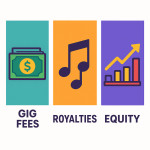Building a reliable team: where singers find session musicians and arrangers
You have the melodies and the drive, yet transforming demos into polished releases or stage-ready shows requires trusted partners. This guide shows you, step by step, how to source, vet, and nurture session musicians and arrangers who elevate your sound and respect your deadlines.
Why every singer needs dependable session musicians
Session musicians plug skill gaps, speed up production, and add fresh creative sparks. A reliable guitarist or drummer can turn a half-formed idea into an audience-ready performance within hours. Consistency also matters: venue bookers and music supervisors value singers who arrive with a tight, rehearsed band.
The cost of unreliable collaborators
- Missed studio slots—lost deposits and shifted release plans.
- Inconsistent live sets—audience confidence drops, merch sales follow.
- Legal headaches—publishing splits and credit disputes erode trust.
Core qualities of a top-tier session musician
- Technical proficiency—sight-reading or quick ear learning saves rehearsal hours.
- Professional gear—well-maintained instruments and redundant backups.
- Punctual communication—clear, prompt replies to charts, stems, and schedule changes.
- Positive attitude—willingness to take direction and experiment.
- Business literacy—familiar with basic contracts and invoicing.
Where singers actually find session musicians and arrangers
1. Specialist talent directories
Online directories dedicated to music professionals let you filter by instrument, genre, location, and rate. They present verified credits, making first-round vetting faster than scrolling generic social feeds. Explore the collaboration job board for singers to see who is available this week.
2. Local conservatories and music colleges
Final-year students often seek real-world gigs to build résumés. Post notices on campus boards and offer fair day-rate packages. You gain enthusiastic players; they earn credits.
3. Producer and arranger forums
Genre-specific Discord servers or Facebook groups centred on trap horn arrangements or string quartets can yield niche experts. Always request three recent session references before committing.
4. Remote recording marketplaces
Platforms such as SoundBetter or AirGigs let you hire musicians who record in their own studios and deliver stems. This option is ideal when travel budgets are tight but production timelines are firm.
5. Referral loops
Each pro you work with knows five more. After a successful take, ask your guitarist to recommend a drummer with similar work ethics.
Session musician vs. arranger: who does what?

Many singers assume the arranger is simply another instrumentalist, yet the two roles tackle distinct layers of the same song. The session player focuses on perfect execution of pre-written parts, supplying texture, groove and pocket on demand, whereas the arranger zooms out to sculpt the harmonic landscape, reharmonise weak choruses, and distribute countermelodies across the band. When both experts collaborate early, you save rehearsal hours, avoid clashes in register, and unlock unexpected hooks that give your track replay value.
| Role | Main Deliverable | Typical Pay Structure | Best Contact Channel |
|---|---|---|---|
| Session Musician | Instrument or vocal performance recorded or live | Hourly or day rate + usage buyout | Talent directory, local scene, referrals |
| Arranger | Converted lead sheet or demo into full score/parts | Per song fee or percentage of publishing | Composer forums, scoring agencies, producer networks |
Evaluating candidates in three short steps
Step 1 – Quick portfolio audit
Scan showreels for timing, tone, and versatility. Cross-check credits through session contract metadata on streaming services.
Step 2 – 10-minute chemistry call
Ask about their favourite gig, toughest studio moment, and how they solved it. You will gauge personality and problem-solving skills fast.
Step 3 – Paid test session
Send one verse and chorus, pay a half-rate, and assess turnaround time. If communication or file naming is sloppy, move on.
Drafting airtight collaboration agreements
Every reliable team runs on clear paperwork. Include:
- Project scope (number of songs, live dates).
- Delivery formats (48kHz WAV, MIDI, PDF charts).
- Revision policy (two minor edits included).
- Payment milestones (50 % upfront, 50 % on stem delivery).
- Credit and publishing splits.
For complex orchestrations, study the crowdsourced orchestra model to see how large teams divide royalties fairly.
Rehearsal workflows that save everyone's time
Use shared calendars and colour-coded sheets to keep tracking simple. Apps like Soundcheck or JamKazam reduce latency during remote run-throughs. If band members juggle multiple gigs, apply flexible rehearsal scheduling tactics to lock dates smoothly.
Session musicians and arrangers: pricing benchmarks
Rates vary by territory, genre, and urgency. Still, expect the following 2025 ballpark:
- Electric guitarist (studio) — €250-€400 per day.
- Drummer (live show) — €300-€600 including gear haul.
- String arranger — €400-€800 per track for quartet charts.
- Horn section transcription — €150 per instrument, per chart.
Onboarding checklist to solidify long-term partnerships
- Share reference tracks and BPM information before the first rehearsal.
- Provide paper charts and PDFs in the same key—avoid last-minute transposition chaos.
- Confirm dress code and stage plot for live shows.
- Agree on social media guidelines to prevent premature leaks.
- Schedule a debrief after each gig to refine cues.
FAQ
- Do I need separate contracts for session musicians and arrangers?
- Yes. Performers and arrangers contribute different intellectual property, so the clauses on publishing splits and royalty participation should be tailored to each role.
- How early should I book musicians for a tour?
- Secure core players three to six months out, even if venues are not finalised. This protects calendars and lets everyone budget accordingly.
- Can remote session musicians match the vibe of my in-person band?
- With clear references, click-track cues, and real-time feedback via video calls, remote players can integrate seamlessly. Always run one live rehearsal before a major release.
- What is a fair publishing split for an arranger?
- For pop and jazz, 5-10 % of the writer's share per substantial arrangement is common. Complex orchestral rewrites can warrant higher percentages.
- How do I handle last-minute cancellations?
- Insert a replacement clause in your contracts: the original musician must suggest a qualified substitute or forfeit a portion of their fee.
Quick knowledge check
Take action now
Post your next project brief on a specialist directory, shortlist three candidates today, and schedule a paid test session this week. Building a reliable team of session musicians and arrangers starts with one decisive step—make it yours.











